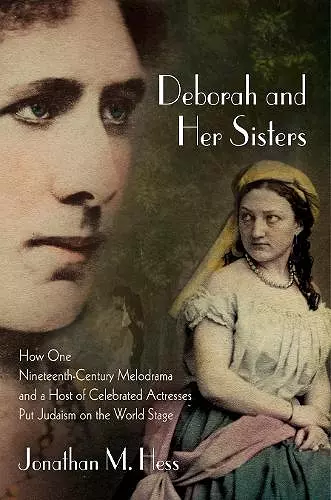Deborah and Her Sisters
How One Nineteenth-Century Melodrama and a Host of Celebrated Actresses Put Judaism on the World Stage
Format:Hardback
Publisher:University of Pennsylvania Press
Published:24th Nov '17
Currently unavailable, and unfortunately no date known when it will be back

Before Fiddler on the Roof, there was Deborah, a blockbuster melodrama about a Jewish woman forsaken by her non-Jewish lover. Deborah and Her Sisters offers the first comprehensive history of this transnational phenomenon, focusing on its ability to bring Jews and non-Jews together during a period of increasing antisemitism.
Before Fiddler on the Roof, before The Jazz Singer, there was Deborah, a tear-jerking melodrama about a Jewish woman forsaken by her non-Jewish lover. Within a few years of its 1849 debut in Hamburg, the play was seen on stages across Germany and Austria, as well as throughout Europe, the British Empire, and North America. The German-Jewish elite complained that the playwright, Jewish writer S. H. Mosenthal, had written a drama bearing little authentic Jewish content, while literary critics protested that the play lacked the formal coherence of great tragedy. Yet despite its lackluster critical reception, Deborah became a blockbuster, giving millions of theatergoers the pleasures of sympathizing with an exotic Jewish woman. It spawned adaptations with titles from Leah, the Forsaken to Naomi, the Deserted, burlesques, poems, operas in Italian and Czech, musical selections for voice and piano, a British novel fraudulently marketed in the United States as the original basis for the play, three American silent films, and thousands of souvenir photographs of leading actresses from Adelaide Ristori to Sarah Bernhardt in character as Mosenthal's forsaken Jewess.
For a sixty-year period, Deborah and its many offshoots provided audiences with the ultimate feel-good experience of tearful sympathy and liberal universalism. With Deborah and Her Sisters, Jonathan M. Hess offers the first comprehensive history of this transnational phenomenon, focusing on its unique ability to bring Jews and non-Jews together during a period of increasing antisemitism. Paying careful attention to local performances and the dynamics of transnational exchange, Hess asks that we take seriously the feelings this commercially successful drama provoked as it drove its diverse audiences to tears. Following a vast paper trail in theater archives and in the press, Deborah and Her Sisters reconstructs the allure that Jewishness held in nineteenth-century popular culture and explores how the Deborah sensation generated a liberal culture of compassion with Jewish suffering that extended beyond the theater walls.
"Deborah and her Sisters is the result of magnificent archival research. It is also clearly a labor of love: the author takes pleasure in the story he tells of a single play's journey, making the book a delight to read . . . Hess's volume is a must-read for those who work in nineteenth-century theater, performance, or especially Jewish Studies, but it also has much to offer a general Victorianist as a case study for the importance of theater in shaping ideas, effecting change, and challenging our settled contemporary notions of aesthetic merit by confronting what many Victorians themselves valued." * Victorian Studies *
"An exuberant account of the transnational performance history of a forgotten blockbuster, this book sets a new standard for Jewish cultural studies. By carefully reconstructing the contexts in which Jewish and non-Jewish theater audiences came together to cry over a melodramatic tale of Jewish suffering, Jonathan M. Hess reveals the importance of philosemitism to the nineteenth-century liberal imagination." * Maurice Samuels, Yale University *
"Deborah and Her Sisters presents a new and constructively critical approach to the study of philosemitism and to the study of representations of Jews and Jewishness in general. This is cultural studies at its best-in excavating and interpreting a largely forgotten and demonstrably significant theatrical blockbuster, Jonathan M. Hess forces us to rethink key methodological questions and to reevaluate our understanding of an era." * Martha B. Helfer, Rutgers University *
ISBN: 9780812249583
Dimensions: unknown
Weight: unknown
272 pages